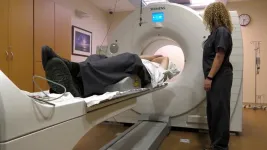(Press-News.org) Both the injectable and oral forms of semaglutide, a glucagon-like peptide-1 receptor agonist, have gained recent attention for their effectiveness against weight gain, high blood sugar, and even alcohol cravings.
A new clinical trial, co-led by endocrinologist and diabetes expert John Buse, MD, PhD, and interventional cardiologist Matthew Cavender, MD, MPH, at the UNC School of Medicine has shown that the oral form of semaglutide can significantly reduce cardiovascular events in people with type 2 diabetes, atherosclerotic cardiovascular disease, and/or chronic kidney disease.
“Heart attacks and strokes are among the most common and devastating complications of diabetes,” said Buse, who is the Verne S. Caviness Distinguished Professor of Medicine and Director of the UNC Diabetes Care Center. “Semaglutide has been a main stay of our efforts to reduce heart attack and stroke in people with diabetes. Having an oral option to deliver this highly effective therapy is a big advance.”
[caption id="attachment_37583" align="alignright" width="231"] John B. Buse, MD, PhD[/caption]
Results from the rather large, international trial were published in the New England Journal of Medicine and presented at the American College of Cardiology's Annual Scientific Session & Expo in Chicago, Illinois.
Type 2 diabetes is a progressive disease that affects one’s ability to control blood sugar levels.
People with the condition need to closely monitor their diet and activity and may need to take medications as their blood sugar becomes more difficult to manage. Those with type 2 diabetes are at a significantly higher risk of cardiovascular disease because they may develop high blood pressure, high cholesterol, or both, as a result of uncontrolled blood sugar.
Glucagon-like peptide-1 (GLP-1) receptor agonists, such as semaglutide, have shown much potential for lowering blood sugar, but little is known about whether the oral form of semaglutide actually decreases major cardiovascular events, such as heart attacks and stroke.
The Semaglutide cardiOvascular oUtcomes triaL (SOUL) recruited 9,650 people for the study who have pre-existing cardiovascular disease, such as coronary artery disease, symptomatic peripheral arterial disease, cerebrovascular disease, or chronic kidney disease. The trial was sponsored and funded by pharmaceutical company Novo Nordisk, Inc.
Participants were divided into a placebo group (no medication) and a drug group to see if those taking oral semaglutide were more or less likely to experience major cardiac events. Both groups were given standard-of-care glucose-lowering and cardiovascular risk-reducing therapies according to local guidelines. Those in the medication group took a once-daily 14mg dose of oral semaglutide.
Researchers found that oral semaglutide decreased the risk of major cardiovascular events by 14% compared to placebo across age and gender. Of all types of major cardiac events studied in the clinical trial, nonfatal myocardial infarction saw the greatest reductions in risk.
The effect of oral semaglutide on cardiovascular outcomes was consistent with other clinical trials involving injectable semaglutide, but more trials are needed to determine if one method may be more effective than the other at reducing major cardiovascular events.
END
Oral semaglutide vastly reduces heart attacks, strokes in people with type 2 diabetes
2025-03-29
ELSE PRESS RELEASES FROM THIS DATE:
Prothrombin complex concentrate vs frozen plasma for coagulopathic bleeding in cardiac surgery
2025-03-29
About The Study: In this unblinded randomized clinical trial, prothrombin complex concentrate had superior hemostatic efficacy and safety advantages to frozen plasma among patients requiring coagulation factor replacement for bleeding during cardiac surgery.
Corresponding Author: To contact the corresponding author, Keyvan Karkouti, MD, email keyvan.karkouti@uhn.ca.
To access the embargoed study: Visit our For The Media website at this link https://media.jamanetwork.com/
(doi:10.1001/jama.2025.3501)
Editor’s Note: Please see the article for additional information, including other authors, author contributions and affiliations, ...
Who needs a statin? New study compares prescribing recommendations based on traditional risk factors vs. coronary artery calcium scoring
2025-03-29
A new study by researchers at Intermountain Health in Salt Lake City aims to determine the best method to screen and evaluate patients who are at risk of developing coronary heart disease and which patients would benefit from taking a statin medication to lower cholesterol.
Currently, cardiologists determine a patient’s need for a statin based on traditional risk factors, using the Pooled Cohort Equation (PCE), which calculates coronary risk by assessing the risk factors of age, sex, total and HDL cholesterol levels, blood pressure, and whether someone ...
Finerenone and atrial fibrillation in heart failure
2025-03-29
About The Study: The efficacy of finerenone was consistent regardless of atrial fibrillation status in this study. New-onset atrial fibrillation was associated with a substantially higher risk of subsequent outcomes.
Corresponding Author: To contact the corresponding author, John J. V. McMurray, MD, email john.mcmurray@glasgow.ac.uk.
To access the embargoed study: Visit our For The Media website at this link https://media.jamanetwork.com/
(doi:10.1001/jamacardio.2025.0848)
Editor’s Note: Please see the article for additional information, including other authors, ...
Low coronary artery calcium score is associated with an excellent prognosis regardless of a person’s age, new study finds
2025-03-29
Having a coronary artery calcium (CAC) score of zero has generally been accepted as a marker of a very low risk of having a cardiac event within the next five years. However, age is a strong contributor to coronary risk, with risk increasing markedly as people age.
Whether age-related risk factors diminish the low risk predicted by a zero coronary artery calcium score has been uncertain – until now.
A large new study of more than 40,000 patients from heart researchers at Intermountain Health in Salt Lake City finds that a zero coronary artery calcium score continues to be an accurate indicator of a low risk for a coronary ...
Groundbreaking consensus statement on conduction system pacing released: a major milestone in the evolution of pacing therapy
2025-03-29
Vienna, 30 March 2025– The European Society of Cardiology (ESC) has released a groundbreaking consensus statement on conduction system pacing (CSP), marking a significant milestone in the evolution of pacing therapy. The document was officially presented today at the EHRA 2025 congress in Vienna and simultaneously published in EP Europace.
For over 50 years, right ventricular pacing has been a standard treatment for slow heart rhythms. However, in some patients, this approach can lead to reduced heart function and even heart failure. Furthermore, biventricular pacing ...
Nuclear monitoring system suggests landslide cut off internet in west Africa
2025-03-29
Hydroacoustic signals captured by the world’s international nuclear monitoring system suggest an underwater landslide may have broken communications cables and disrupted internet traffic in west African countries for several weeks in March 2024.
Researchers used data collected by hydrophones installed by the International Monitoring System of the Comprehensive Nuclear-Test-Ban Treaty Organization (CTBTO) to determine the location of the possible landslide, placing it along the steep slopes of Trou Sans Fond Canyon offshore of Ivory Coast.
The proposed landslide corresponds with the timing and location of four broken cables in the canyon, according to Vaibhav Vijay Ingale of UC ...
PNNL scientist elected AAAS fellow
2025-03-29
RICHLAND, Wash.—Chemist Zheming Wang, whose research largely focuses on the chemistry underlying radioactive and advanced energy materials, as well as critical elements, has been elected as a Fellow of the American Association for the Advancement of Science—the highest honor the society bestows. AAAS is the world's largest multidisciplinary scientific society with a mission to “advance science, engineering, and innovation throughout the world for the benefit of all people.”
AAAS notes that Fellows are celebrated for contributions that span ...
American College of Cardiology recognizes five JACC Rocket Fuel Consultants
2025-03-28
The American College of Cardiology will honor five cardiovascular experts with the JACC Rocket Fuel Consultant Award for fueling JACC’s mission to provide high-quality, pertinent research and improve heart health for all. The awardees will be recognized during ACC’s Annual Scientific Session (ACC.25) in Chicago.
This is the first year of the JACC Rocket Fuel Consultant Award. The JACC consultant program invites experts to provide comprehensive assessments of a submission’s quality, importance and impact. Their contributions streamline the review process and ensure that JACC maintains its commitment to high-quality research.
The 2025 JACC Rocket ...
American College of Cardiology, Association of Black Cardiologists recognize three Merck Research Fellowship awardees
2025-03-28
The American College of Cardiology and the Association of Black Cardiologists have selected three recipients of the Merck Research Fellowship Award, fostering the next generation of cardiovascular investigators. Awardees will be recognized during the American College of Cardiology’s Annual Scientific Session (ACC.25) in Chicago.
The ACC/ABC Merck Research Fellowship provides three, one-year fellowships totaling $100,000 to support one year of cardiovascular research. The year of research began in December 2024 and will run through December 2025.
This year’s recipients and their research titles are:
Temidayo ...
JACC to recognize 2025 Simon Dack Award recipients, Elite Reviewers
2025-03-28
JACC, the flagship journal of the American College of Cardiology, has awarded two peer reviewers with the Simon Dack Award for Outstanding Scholarship and seven peer reviewers with Elite Reviewer awards.
Named after the founding editor of JACC, the Simon Dack Award recognizes outstanding peer reviewers whose contributions have helped JACC achieve its mission to publish new and important clinical research. The 2025 recipients are:
Kershaw V. Patel, MD, Houston Methodist Hospital, Houston
Robert S. Rosenson, MD, Mount Sinai Fuster Heart Hospital, Icahn School of Medicine at Mount Sinai, New York
The Elite Reviewers are peer reviewers ...



